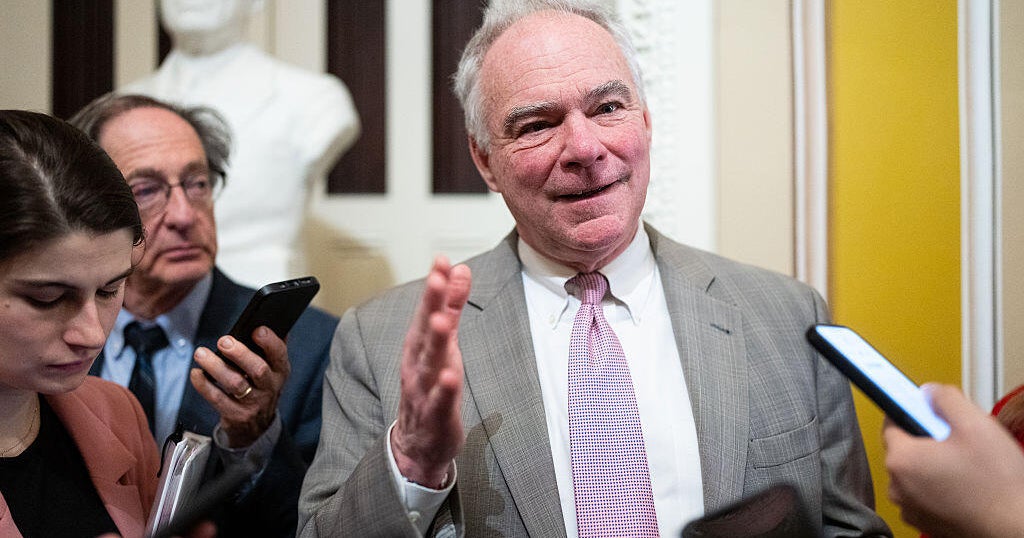Senate Democrats hope to pass COVID economic relief by early March
Senate Democrats on 11 committees are working to craft the components of the COVID-19 economic relief plan outlined by President Biden within the next two to three weeks, top Congressional aides say. Their goal is to pass the full bill and send it to the president's desk by early March.
The news comes as a group of 10 Republicans have been trying to push their own economic relief proposal. Democrats say they are open to incorporating some Republican ideas, but are prepared to move ahead with or without GOP support.
The Democrats' timeframe would prevent a lapse in federal unemployment benefits, which are due to run out on March 14. It would also give states one to two weeks to adjust their unemployment computer systems to reflect the increase in federal benefits from the current $300 per week to the $400 per week that Mr. Biden has proposed.
Unemployment computer systems have been a hurdle in allocating the previous increase. As one Democratic Senate aide noted, about a quarter of state unemployment systems still aren't fully processing the new federal benefits that Congress approved in December. Roughly another quarter of states just got their payments up and running in the past couple weeks.
Some parts of the original $1.9 trillion proposal may get tweaked in a bid to win Republican support, but the unemployment portion is unlikely to undergo much change. Democrats already view the dollar amount — $400 per week — as a concession, given that the benefits were originally pegged at $600 per week at the start of the pandemic. And Democrats feel strongly that offering those benefits for anything less than six months would force lawmakers back to the bargaining table again too quickly, especially given the creaky and outdated nature of most state unemployment computer systems.
The group of 10 Senate Republicans had proposed about three months' worth of unemployment benefits.
There also likely will not be much change in the $350 billion that Mr. Biden proposed for state and local government funding. Since the GOP alternative does not provide any state and local funding, Democrats are unlikely to sway Republicans simply by chipping away at the dollar amount in their plan.
"I would expect it to stay very similar to what President Biden laid out," said one Senate Democratic aide. The aide noted that Democrats might "tinker around the edges" of the proposal to insure that hard-hit rural counties, or localities that are experiencing more pain than others — such as areas that experienced a severe drop in tourism dollars — get the help they need. This would require some kind of system for dispersing the funds that goes beyond a simple population-based formula.
Senate Democrats are considering a new earnings cutoff for the Americans who will receive the $1,400 stimulus checks. Mr. Biden originally proposed sending checks to all individuals making up to $75,00 a year and couples making up to $150,000. But Republicans have argued that earners at the upper end of the spectrum are more likely to put that money into savings, which would not stimulate the economy.
In an attempt to win Republican support, Senate Democrats are now considering a new earnings cutoff. Under the new formulation, individuals making up to $50,000 and couples making up to $100,000 would get the full $1,400. People who earn slightly more than those cutoffs would receive a reduced payout. Parents who meet the income requirements would also receive $1,400 per child, including adult dependents like a child in college or an adult dependent with a disability.
The new formulation is still a work in progress, and could change as legislation is crafted.
Because Democrats are hoping to pass the bill by the beginning of March – when most Americans still will not have filed their 2020 tax returns – the IRS would base its payouts primarily on filers' 2019 tax returns. This could prove problematic, since many people saw a significant reduction in income between 2019 and 2020. Anyone who thinks their 2020 income qualifies them for a larger check would be encouraged to file their return before the checks go out.
Mr. Biden and other White House officials have repeatedly said that while they are flexible on the income cutoff, they are determined to stick with the $1,400 payouts and not scale back to $1,000 as Republicans have proposed. While the White House has not commented directly on the proposed income formulation, it's unlikely Senate Democrats would be floating it if the White House were not on board.
The 10 Republicans sent a letter to the White House on Thursday saying they have "significant questions" about the size of Mr. Biden's relief bill. But they said they were "encouraged" by reports that the administration is "considering further targeting the direct payments to lower- and middle-income families."







